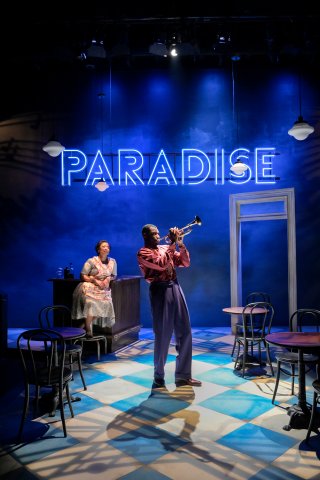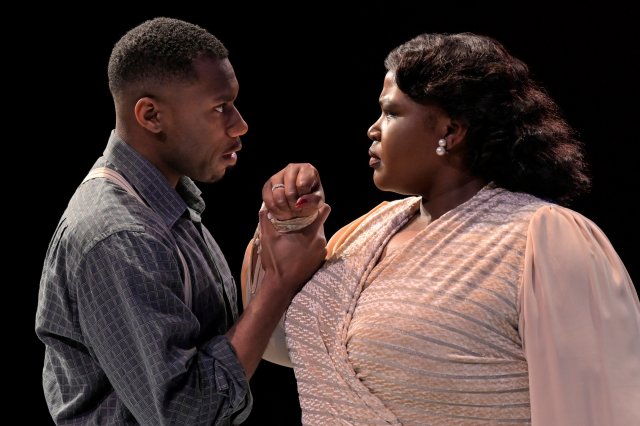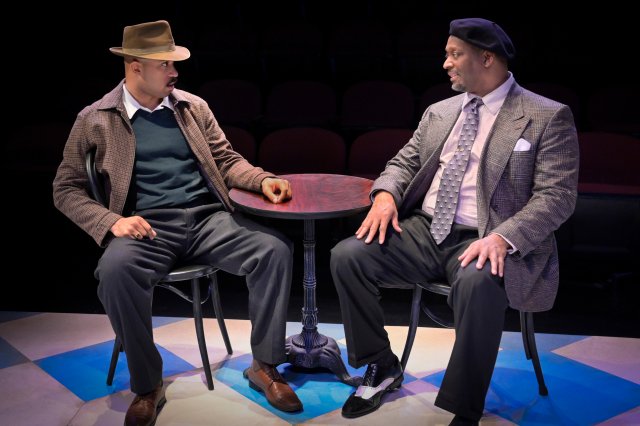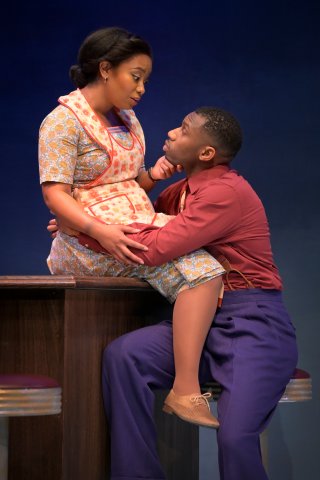Paradise Blue
Urban Renewal and Human Destruction in 1950s Detroit.
By: Victor Cordell - Feb 04, 2023
Post-World War II urban planning from New York City to San Francisco and many cities in between failed egregiously. It supplanted ethnic neighborhoods, usually African-American, with sterile public housing that failed to improve living conditions, or with freeways that divided communities but rarely reduced traffic. Though the previous housing stock often consisted of blighted tenements, they were neighborhoods that provided a sense of belonging and dignity to most residents. Most of these areas were largely redeemable if granted the investment that went instead to rebuild from scratch. But by political imposition, not only was the baby thrown out with the bathwater, but the replacement was more pernicious bathwater.
Against this backdrop, Dominique Morisseau has authored the final installment of her Detroit Trilogy. Previously, she explored race riots and relationships in “Detroit ‘67” and the effect of economic decline in traditional industries on the Black working class in “Skeleton Crew.”
With “Paradise Blue,” she looks at a Black neighborhood of Detroit called Black Bottom, so named for its soil and geography, not for the people who later settled it or for the dance. The area housed a vibrant jazz quarter in a district called Paradise Valley. In the late ‘50s, Black Bottom had been targeted for urban renewal – read, destruction. Morisseau has written a sometimes funny but always tense noirish drama which Director Dawn Monique Williams plumbs for all its nuance. The actors find the essence of each character and deliver a gripping entertainment.
The Paradise of the title refers to the name of the jazz club and boarding house where the action of the play takes place. Blue refers to its second-generation owner, who leads a quartet that performs at the club. He is considered a second-tier trumpet player compared to his late father. And though Blue is not the primary character in terms of stage time, “Paradise Blue” is about him. Fittingly, he treats everything in his orbit as being about him. And despite the fact that the other characters live and work in close proximity and feel like family, Blue, who would be the titular head of household, stands apart.
Titus VanHook portrays Blue in an apt, chillingly cool manner. Suave and sartorially smart, his empathetic detachment from those around him is almost complete. He runs the quartet in his own manner and brooks no interference. A triggering event that has put the other band members (pianist Corn played by Michael J. Asberry and percussionist P-Sam played by Kenny Scott) out of work is that Blue refuses to pay the bass player before gigs rather than after, despite the known consequences of his intransigence.
Blue suffers the unsettling spirits of his parents in the four walls around him. Selling the property for the renewal project would give him the money to escape and begin a new life elsewhere, but the question is whether the demons would follow. As far as others in the community who would be displaced, he doesn’t seem to have any concern.
Like many dissociative types, Blue has room for only one person who he can share warm moments with, even if he can’t totally open up. That person is Pumpkin, who is delightfully portrayed by Anna Marie Sharpe. While Blue is a one-note character who has difficulty living in his own skin, the well-written character of modest Pumpkin is complex, yet she is highly content with the simplicity of her existence. A one-woman boarding house cook, server, and cleaning crew, she is happy to serve others and perform simple tasks in a small sandbox. Despite her mousy affect, she draws empowerment from the beauty and symbolism of the works of Harlem Renaissance poet Georgia Douglass Johnson. And though Pumpkin blushes at foul language, she does appear to have a carnal relationship with Blue.
Into this already tempestuous situation walks trouble in the form of a traveling woman, Silver, who takes lodging at the Paradise. Rumors about this black-widow, Louisiana woman swirl – 50 men in 50 cities, murdered her husband, practices voodoo. What is true is that she’s an exceptionally strong woman, and her plans and actions could have some significant consequences in a short period of time. As with Pumpkin, Morisseau endows this female with more breadth than the men in the show. As Silver, a sassy and confident Rolanda D. Bell shows how women with conviction can hold their ground.
Although the context of “Paradise Blue” is a grand scale project, the playwright’s concerns are with the individuals whose lives will be buffeted by the larger scheme of things. The intimacy of Aurora Theatre serves this play well. There is some stage clutter having both the club venue and bedroom scenery on the stage throughout, but the closeness of the performers to the audience enhances the intensity of the fine drama.
“Paradise Blue” is written by Dominique Morisseau, produced by Aurora Theatre, and plays on its stage at 2081 Addison Street, Berkeley, CA through February 26, 2023.




